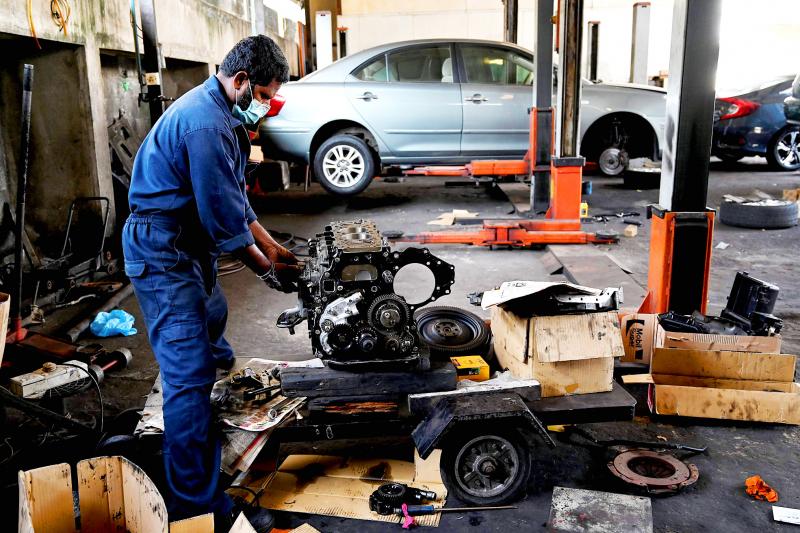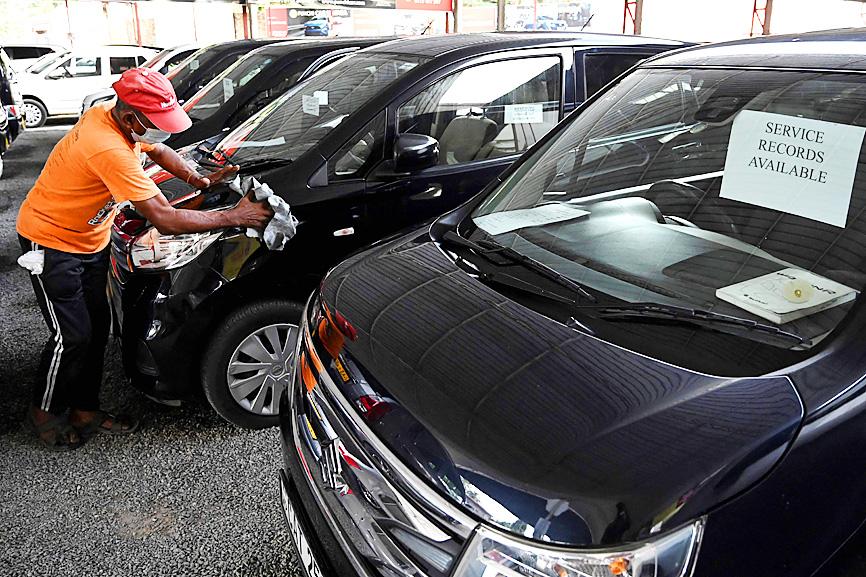Supermarket shelves are bare and restaurants cannot serve meals, but Sri Lanka’s economic crisis is a bonanza for used auto dealers, with vehicle shortages pushing prices higher than a house in a nice area.
The island nation of 22 million is on the brink of bankruptcy, inflation is red hot and the government has barred a range of “non-essential” imports to save US dollars needed to buy food, medicine and fuel.
In the vehicle market, this two-year ban has kept factory-fresh automobiles off local roads, forcing desperate buyers to pay some of the world’s highest prices for beaten-up compacts and no-frills family sedans.

Photo: AFP
Anthony Fernando spent a recent weekend coursing through sales lots in the Colombo outskirts on behalf of his daughter, who has tried to find an affordable set of wheels for nearly a year.
“She was thinking that prices will come down,” but now she is “paying for procrastinating,” the 63-year-old said.
Prices have gone “beyond the reach of a common person,” he said.

Photo: AFP
A five-year-old Toyota Land Cruiser was on offer online for an eye-watering 62.5 million rupees (US$309,654) — triple the pre-ban rate, and enough to buy a house in a middle-class Colombo neighborhood or a new luxury apartment in the city center.
A decade-old Fiat five-seater with a busted engine that might be stripped for parts elsewhere was listed at US$8,250 — more than twice Sri Lanka’s average yearly income.
“A car and a house are symbols of success,” said a grinning Sarath Yapa Bandara, the owner of one of the capital’s biggest dealerships. “That is why most people are willing to buy even at these high prices.”
‘OUT OF THIS WORLD’
Vehicle ownership remains a virtual necessity in the traffic-snarled streets of Colombo, where a ramshackle bus and rail network was already struggling with overcrowding.
The number of taxis has also fallen sharply, with drivers selling their cabs to cash in on the dizzying prices, and those still working charging double their old fares or more.
“You must have your own car,” said Udaya Hegoda Arachchi, another buyer preparing to bite the bullet at a dealership.
“We can’t expect prices to come down anytime soon, given the economic situation in the country,” he said.
COVID-19 has sent Sri Lanka into a tailspin, drying up all-important earnings from tourism and foreign remittances.
In March 2020, the government brought in a wide-ranging import ban, including on new vehicles, to stop foreign currency from leaving the country.
However, the policy has not been able to staunch the outflow of US dollars, and has instead left the nation struggling to source critical goods.
Food retailers have rationed rice, restaurants have shuttered, because they cannot find cooking gas, while cash-strapped power utilities unable to afford oil have imposed rolling blackouts. Farmers have even run out of fertilizer.
CHINESE DEBT
Rating agencies have warned that Sri Lanka might default soon, although the government has pledged to meet its commitments.
It is trying to renegotiate its Chinese debts with Beijing.
The import ban has also left vehicle parts in short supply, meaning drivers are at risk of being stranded after a breakdown.
Ravi Ekanayake said that his Colombo repair garage was doing a roaring trade from owners unable to afford the astronomical costs of switching to a new vehicle.
“But parts are scarce. It is a catch-22: You either get caught with an old car without parts or you don’t have the money to buy a new car,” he said.
JB Securities chief executive and financial analyst Murtaza Jafferjee said the prices also underscored a problem caused by excessive money printing by a cash-strapped central bank, with “too much money chasing too few goods.”
The prices were also increasing transport costs and adding to inflation, which hit a record 14 percent last month, he said.
“When vehicles become unaffordable for a segment of society, their activities will be limited. Then we will also see a loss of economic output,” Jafferjee said. “We are about to collapse and not many people appreciate the depth of the problem.”

GROWING OWINGS: While Luxembourg and China swapped the top three spots, the US continued to be the largest exposure for Taiwan for the 41st consecutive quarter The US remained the largest debtor nation to Taiwan’s banking sector for the 41st consecutive quarter at the end of September, after local banks’ exposure to the US market rose more than 2 percent from three months earlier, the central bank said. Exposure to the US increased to US$198.896 billion, up US$4.026 billion, or 2.07 percent, from US$194.87 billion in the previous quarter, data released by the central bank showed on Friday. Of the increase, about US$1.4 billion came from banks’ investments in securitized products and interbank loans in the US, while another US$2.6 billion stemmed from trust assets, including mutual funds,

AI TALENT: No financial details were released about the deal, in which top Groq executives, including its CEO, would join Nvidia to help advance the technology Nvidia Corp has agreed to a licensing deal with artificial intelligence (AI) start-up Groq, furthering its investments in companies connected to the AI boom and gaining the right to add a new type of technology to its products. The world’s largest publicly traded company has paid for the right to use Groq’s technology and is to integrate its chip design into future products. Some of the start-up’s executives are leaving to join Nvidia to help with that effort, the companies said. Groq would continue as an independent company with a new chief executive, it said on Wednesday in a post on its Web

JOINT EFFORTS: MediaTek would partner with Denso to develop custom chips to support the car-part specialist company’s driver-assist systems in an expanding market MediaTek Inc (聯發科), the world’s largest mobile phone chip designer, yesterday said it is working closely with Japan’s Denso Corp to build a custom automotive system-on-chip (SoC) solution tailored for advanced driver-assistance systems and cockpit systems, adding another customer to its new application-specific IC (ASIC) business. This effort merges Denso’s automotive-grade safety expertise and deep vehicle integration with MediaTek’s technologies cultivated through the development of Media- Tek’s Dimensity AX, leveraging efficient, high-performance SoCs and artificial intelligence (AI) capabilities to offer a scalable, production-ready platform for next-generation driver assistance, the company said in a statement yesterday. “Through this collaboration, we are bringing two

Even as the US is embarked on a bitter rivalry with China over the deployment of artificial intelligence (AI), Chinese technology is quietly making inroads into the US market. Despite considerable geopolitical tensions, Chinese open-source AI models are winning over a growing number of programmers and companies in the US. These are different from the closed generative AI models that have become household names — ChatGPT-maker OpenAI or Google’s Gemini — whose inner workings are fiercely protected. In contrast, “open” models offered by many Chinese rivals, from Alibaba (阿里巴巴) to DeepSeek (深度求索), allow programmers to customize parts of the software to suit their